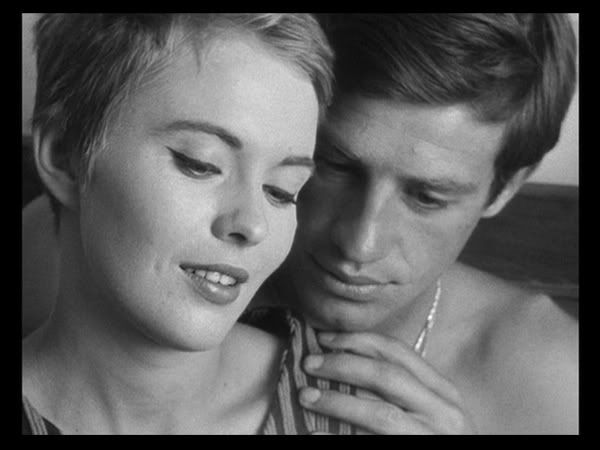
When Jean-Paul Belmondo’s fedora wearing, cigarette chewing Michel Poiccard declares at the beginning of the film that he is an “asshole”, he’s not kidding. A womanizing, self-absorbed, wannabe criminal, he spends his days making schemes and his nights chasing skirts. He idolizes Humphrey Bogart but carries none of his charm or gentlemanly manners. Poiccard's foil is the shatteringly gorgeous Patricia Franchini (Jean Seberg), an American student in Paris, and the only woman who resists his carefully constructed persona.
What continues to make Jean-Luc Godard’s debut film so fresh and exciting nearly fifty years since its release, is its unguarded ambition. The thin plot, in which Poiccard murders a policeman and goes on the run, is merely a foundation for screenwriter François Truffaut to use his characters as a platform to expound a world of ideas on France, politics, love, sex, women and philosophy. In fact, the film’s central sequence – and also its longest - does absolutely nothing to move the plot forward. It is simply Poiccard and Franchini in her apartment talking, arguing, insulting each other, espousing opinions, smoking cigarettes, and making love.
If Poiccard is a mess of bravely stated contradictions, Franchini’s purposely elusive sexuality is almost sinister. Franchini openly courts other men, coyly dismisses Poiccard’s advances yet ends up running into his arms. She follows him as he evades a police manhunt, yet her true intentions remain secretive until the final frames. For both Poiccard and viewer alike, it’s difficult to parse what Franchini’s true intentions really are. Does she really love Poiccard or is she just curious about what it's like being with a bad boy? Does she want to be a journalist or does she simply enjoy being the focus of powerful men’s eyes? Ultimately, the two are perfect for each other, as both are so caught up in their carefully arranged personalities, they lose track of who they actually are.
However, to write off Poiccard and Franchini as simply immature would be to miss the point entirely. Breathless resonates because it captures the exuberant energy of being young and in love, and embracing hardline convictions about anything and everything even when it’s coupled with a certainty in nothing. With a playful, casual spirit Godard both celebrates and repudiates the impulsiveness and naivete of youth in equal measure, but is always in full admiration of its unquenchable energy.



No comments:
Post a Comment